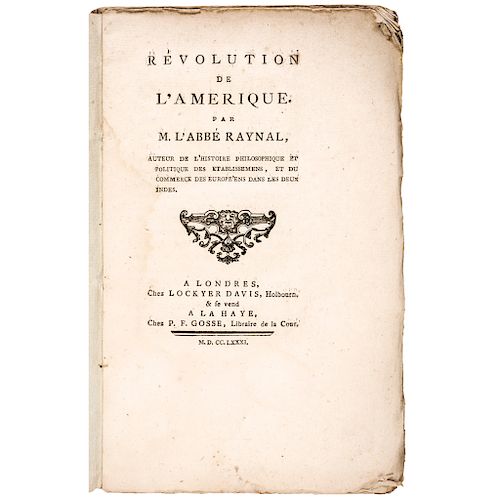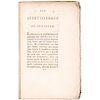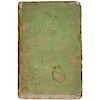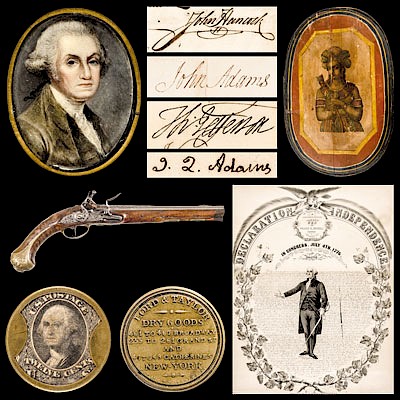1781 First Edition Book Historical Essay on American Revolution by Abbe Raynal,
Lot 160
Estimate:
$600 - $800
Absentee vs Live bid
Two ways to bid:
- Leave a max absentee bid and the platform will bid on your behalf up to your maximum bid during the live auction.
- Bid live during the auction and your bids will be submitted real-time to the auctioneer.
Bid Increments
| Price | Bid Increment |
|---|---|
| $0 | $10 |
| $200 | $20 |
| $300 | $25 |
| $500 | $50 |
| $1,000 | $100 |
| $2,000 | $200 |
| $3,000 | $250 |
| $5,000 | $500 |
| $10,000 | $1,000 |
| $20,000 | $2,000 |
| $30,000 | $2,500 |
| $50,000 | $5,000 |
| $100,000 | $10,000 |
| $200,000 | $20,000 |
| $300,000 | $25,000 |
| $500,000 | $50,000 |
About Auction
By Early American History Auctions
Jun 1, 2019
Set Reminder
2019-06-01 12:00:00
2019-06-01 12:00:00
America/New_York
Bidsquare
Bidsquare : Historic Autographs, Colonial Currency, Political Americana & Revolutionary War Era
https://www.bidsquare.com/auctions/early-american-history-auctions/historic-autographs-colonial-currency-political-americana-revolutionary-war-era-4152
Historic Autographs, Coins, Currency, Political, Americana, Historic Weaponry and Guns, John Adams, Thomas Jefferson, Early American History Auctions auctions@earlyamerican.com
Historic Autographs, Coins, Currency, Political, Americana, Historic Weaponry and Guns, John Adams, Thomas Jefferson, Early American History Auctions auctions@earlyamerican.com
- Lot Description
American Revolution
1781 First Edition Of "REVOLUTION DE L'AMERIQUE"
1781 First Edition Book entitled "REVOLUTION DE L'AMERIQUE," by Abb Raynal, Printed by Chez Lockier Davis, Holborn, London, Fine.
This important 18th century treatise was a highly informative work which contains an historical essay on the American Revolution. This is one of a few editions issued the first year 1781, some with, most without the frontispiece. The text is printed in French. Volume numbers 171-pages with separate 16-pages of preliminaries; and measures approximately 8.75" tall x 5.5" wide x .75" thick. This rare book remains in quite good overall condition with typical issues of age. Raynal urged the Americans to found their liberty on constitutionalism, union, freedom of conscience, and the education of the people. The cover is well worn, spine tips chipped, spine cocked, page edges uncut, scattered light foxing, occasional minor damp staining, page edges untrimmed, as issued, and is generally clean internally. All in all, this desirable treatise remains very presentable.
Abb Guillaume Thomas Franois Raynal (1713-1796) was a noted French historian and philosopher. Raynal was a priest, but he was dismissed from his parish in Paris. He then turned to writing and sought the society and collaboration of the philosophes. Two historical works, one on the Netherlands (1747) and one on the English Parliament (1748), firmly established his reputation. Arguably his most important work, completed with the assistance of Denis Diderot, was a massive history of the European colonies in the Indies and Americas (1770). It was condemned by the Parlement of Paris (1781) for impiety and its dangerous ideas on the right of the people to revolt and to give or withhold consent to taxation. Nevertheless, the History was extremely popular, passing through many subsequent editions; the radical tone becoming more pronounced in later issues. Placed on the Index of the Roman Catholic Church in 1774, Raynal's book was burned and he was forced into exile in 1781. He was allowed to return to France, but not Paris, in 1784; his Parisian banishment was rescinded in 1790. Elected to the States General in 1789, he refused to serve and later advocated a constitutional monarchy.
- Shipping Info
-
Early American provides in-house worldwide shipping. Please contact us directly if you have questions about your specific shipping requirements.
-
- Buyer's Premium



 EUR
EUR CAD
CAD AUD
AUD GBP
GBP MXN
MXN HKD
HKD CNY
CNY MYR
MYR SEK
SEK SGD
SGD CHF
CHF THB
THB













